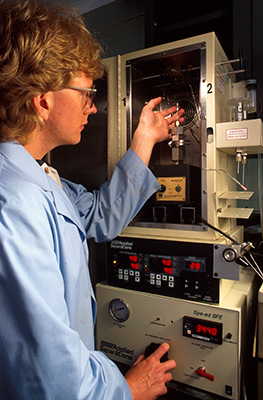Project Shifts the Focus of Agribusiness

ARS chemist Dave Compton adjusts the pressure-control gauge on a device while a biocatalysis reaction occurs inside. He is optimizing procedures for making an all-natural soy-based sunscreen. (Photo by Keith Weller)
Growing more crops does not necessarily lead to greater profit, according to farmers and the researchers who help them. To make production more profitable, Agricultural Research Service (ARS) researchers are working to identify new business opportunities by creating new products from existing crops.
“Farm production has increased 10-fold and 5-fold bushels per acre for corn and soybeans, respectively, over the past century,” said Dave Compton, chemist at the ARS Renewable Products Technology research unit in Peoria, IL. “But the average market-year price per bushel remains at or near historic lows when adjusted for inflation. As one farmer said to me, ‘I don’t have a production problem. I have a demand problem’,” Compton recalled.
The challenge for Compton and his colleagues is to create new or improved high-value products from low-value agricultural crops, and in the process, to give U.S. farmers and producers new market opportunities in the global economy. Compton’s research focuses on new uses for crop oils. The end products of these oils could represent a rich source of value-added potential from a farmer’s crop.
In Compton’s project, “value-added” starts with a relatively low-cost agricultural material, such as soybean oil. Scientists then use environmentally benign biological or chemical methods to create new properties that consumers want. The result is a new a biobased product that can claim a higher retail price than the original agricultural material.
To date, Compton’s research has produced three commercial, value-added products: feruloyl soy glycerides (FSG), feruloyl coconut oil (FCG), and soon-to-be-available feruloyl hemp seed oil (FHO), which are available under the FeruliShield™ label. The products earned the USDA Certified Biobased Product label and contain antioxidant properties to provide protection from sun damage.
“Feruloyl” refers to the ferulic acid that researchers attach to the oil. Ferulic acid is a natural compound in the cell walls of fruits and vegetables. The process developed by researchers for linking the ferulic acid to the oil is so efficient that no further processing or purification is needed for the final product.
According to Compton, ARS-developed technology makes it an easy-to-formulate and effective SPF (sun protection factor) booster and photoprotector for commonly used ultraviolet-sensitive ingredients, such as vitamin C, vitamin E. These products are reducing or replacing some commercial petroleum-based ultraviolet absorbers in personal care products and were shown to perform equally well as UV absorbers, if not better, than their petroleum-based counterparts.
“There is a demand for ‘clean’ or ‘green labeling,’ where consumers want food and personal care products that are derived from all-natural or plant-based ingredients,” Compton said. “Agriculture-based bioproducts are uniquely positioned to fill that consumer demand.”
A look at the profit margins enjoyed by petroleum-based products provides a glimpse of what farmers and producers may see in the future.
About 85% of a barrel of petroleum oil is used for transportation fuel and heavy distillates, and the other 15% for other uses, including personal care products. The profit value of the 15% used for other purposes is nearly equal to that obtained from the other 85% of the barrel. According to Compton, this illustrates the economic potential of high-volume, low-value agricultural product uses (food, feed, and fuel) vs. low-volume, high-value (bioproduct) uses.
“To increase the profitability of agricultural products we need to shift the paradigm of traditional uses (food, feed, and fuel) to include bioproducts,” Compton said. “This can increase the producers’ profitability by increasing demand via expanded, non-traditional markets and garnering a higher price for products.
“Researchers have to develop processes and bioproducts that are cost-competitive and perform equally well or better than existing consumer products,” Compton said. “FeruliShield™ products are significantly more biodegradable in fresh and marine water environments than some commercial, petroleum-based UV absorbers.”
So far, the outlook for the new products is bright: FeruliShield™ technology was named Innovation of the Year for 2023 by Bradley University’s Turner Center for Entrepreneurship. The beauty and personal care industry was valued at about $525 billion in 2023; the sun care ingredient market is projected to grow by 68% in the coming years. – by Scott Elliott, ARS Office of Communications

